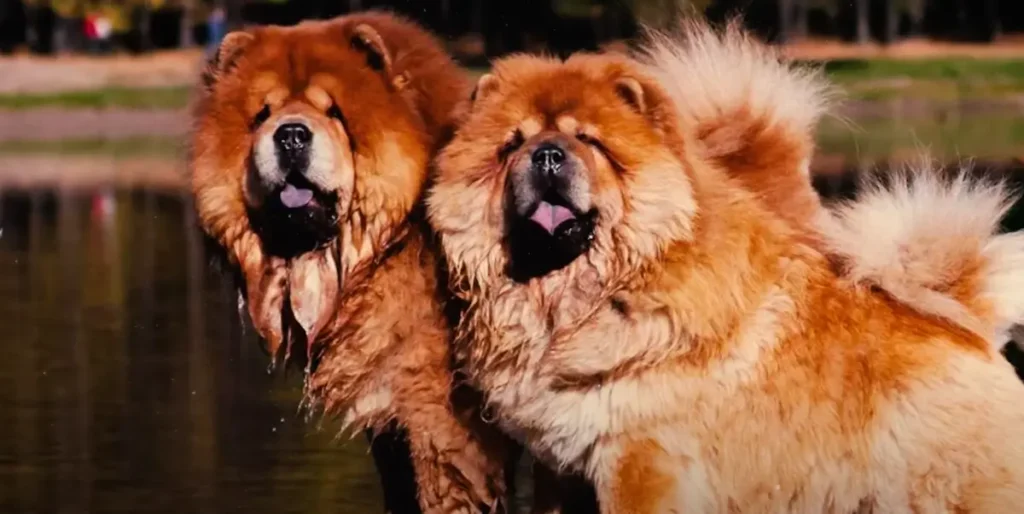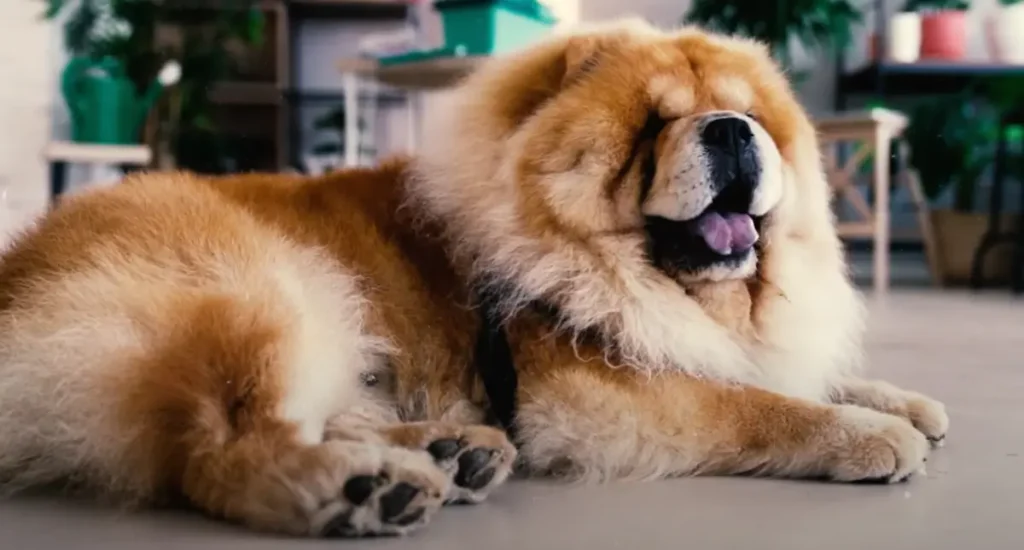Imagine, if you will, a creature with the noble demeanor of a lion, yet the disinterest in your approval that rivals that of the most indifferent feline. That’s the Chow Chow for you, a breed that carries its lion-like mane with an air of aristocracy that makes you wonder if it’s aware of its royal bearing.
As you consider welcoming this dignified canine into your home, remember that their temperament is as distinctive as their appearance. You’ll find that the Chow Chow is not your typical tail-wagging, fetch-playing companion. Instead, they possess a calm and discerning personality and independence that can sometimes be mistaken for aloofness.
Their loyalty, however, is as thick as their luxuriant coat, but it’s reserved for those they deem worthy. Navigating the balance between their self-assured nature and the need for early socialization is essential.
You might be curious how to forge a bond with such a majestic yet enigmatic creature. Let’s just say that understanding the depths of their character is a journey as captivating as the breed’s history.
Chow Chow: Traits, Temperament, and Care Guide
Chow Chows exude an air of nobility, often displaying a cat-like temperament that blends loyalty with independence. Early socialization and consistent training are essential for integrating them into a family environment, and they require regular grooming.
Chow Chows need positive reinforcement to form strong bonds. Regular exercise tempers their independence, while early socialization and training curb their guarding instincts. This ensures that Chow Chows typically develop into well-adjusted companions.
Exploring the Characteristics of the Chow Chow
Delving into the characteristics of the Chow Chow, one finds a breed with a majestic lion-like mane and a temperament that balances independence with an intense loyalty to their family.
| Trait | Impact on Family | Emotional Response |
|---|---|---|
| Lion-like mane | Protective aura | Awe and pride |
| Independent nature | Self-sufficiency | Respect and trust |
| Loyal companions | Deep connection | Warmth and security |
As family members, Chow Chows offer a remarkable blend of distinctive appearance and steadfast temperament, requiring regular grooming to maintain their thick double coat.
Chow Chow: A Comprehensive Profile and Guide
As you consider bringing a Chow Chow into your life, it’s vital to understand this breed’s unique profile. Your knowledge of their grooming needs, socialization requirements, and behavioral traits will inform your approach to training and care.
This guide provides a comprehensive overview, ensuring you’re well-prepared to meet the demands of a Chow Chow companion.
Everything You Need to Know
Understanding the unique characteristics of the Chow Chow breed is essential for prospective owners, as these dogs possess a distinct combination of independence, loyalty, and specific grooming needs.
Their temperament necessitates:
- Early socialization to discern friends from threats
- Consistent training to manage their independent streak
- Routine grooming of their thick, double coat
- Understanding of their reserved nature
- Recognition of their heritage as companions of the Chinese emperor
Discovering the Temperament
When exploring the temperament of the Chow Chow, you’ll find their cat-like demeanor sets them apart. They often present as noble and reserved, especially around unfamiliar faces.
Their independent streak and protective nature demand early training and socialization.
Despite a high prey drive, cautiousness around new people, and unwavering loyalty, remember that socialization is crucial to temper any overprotective tendencies and ensure well-rounded behavior.

Chow Chow: Is It a Good Fit for Families?
You might wonder if a Chow Chow aligns with your family’s lifestyle and environment. Considering their need for a serene atmosphere, they’re more compatible with tranquil households and children who respect their space.
Their independence and protective instincts necessitate early training to ensure they integrate well into a family setting.
Assessing Chow Chow’s Compatibility with Families and Kids
Assessing a Chow Chow’s compatibility with families and kids reveals that this breed may be a better fit for households with older children who respect the dog’s need for personal space.
- Early socialization is crucial for a Chow’s integration.
- Best suited for families with older kids who understand boundaries.
- Chow owners must commit to consistent training.
- Gentle with children when properly socialized.
- Chow Chows form deep bonds with their families.
Chow Adaptation Traits
Chow Chows require a calm environment and space to thrive. They have an independent and reserved demeanor, which demands early socialization and consistent grooming. Their thick double coat requires regular grooming. Chows are generally cautious around new people, so owners must foster a sense of belonging. With its lion-like mane, this fluffy coat predisposes them to hip and elbow dysplasia. Therefore, awareness of Chow adaptation traits is essential for proactive care.
Chow Chow Obedience Essentials
You must establish a firm and consistent training routine to address the Chow Chow’s independent nature.
It’s crucial to commence training early, incorporating socialization to temper their innate suspicion of strangers.
Selecting a reputable breeder who focuses on health and temperament can significantly influence your dog’s responsiveness to obedience training.
Effective Training Strategies
To ensure your Chow Chow becomes a well-mannered companion, start with training strategies that hinge on patience and consistency, utilizing positive reinforcement to capitalize on their independent nature.
| Strategy | Benefit |
|---|---|
| Positive Reinforcement | Encourages good behavior without confrontation |
| Consistent Routine | Builds a reliable framework for obedience |
| Early Socialization | Reduces wariness and enhances adaptability |
Approach training your dog with an understanding that time and patience are essential in shaping the Chow’s temperament.
Exercise and Grooming Needs
Maintaining a chow’s luxurious double coat necessitates regular grooming, including frequent brushing to prevent mats and knots. Chows require diligent grooming to keep their thick double coat pristine, especially during spring and fall when shedding increases.
Regular walks are part of the routine care your chow will need. Additionally, brushing their teeth at least once a week is essential to maintain oral health and prevent excess hair ingestion.

Health Considerations
As you consider a Chow Chow as your companion, it’s critical to be aware of their health predispositions. They’re prone to a range of conditions, from eye disorders to joint dysplasia, which calls for vigilant care and preventative strategies.
Understanding their typical health challenges and lifespan is vital in providing a nurturing environment for your Chow Chow.
Common Health Issues and Lifespan
Chow Chows typically enjoy a lifespan of 8-12 years. Still, they’re prone to several health issues, including hip and elbow dysplasia, various eye conditions, and dental problems linked to their distinctive facial structure.
To ensure your Chow remains generally healthy, regular check-ups with a veterinarian can help manage risks. Monitoring their daily food intake and exercise can prevent issues Chows are known for, like obesity.
Is Chow Chow the Right Pet for You?
Considering the distinctive traits of Chow Chows, you should assess whether their independent nature and grooming needs align with your lifestyle before deciding to bring one into your home.
Their temperament and lion-like mane require dedicated care. Ideal for experienced dog owners, they’re a good fit for homes with older children.
If apartment living is your setting, deliberate space and strategies to keep them happy are essential.
Alternatives for Chow Chow: Majestic and Independent Medium to Large Breeds
Explore these breeds if you’re drawn to the Chow Chow’s majesty and independence. They are ideal for those who value dignified and self-reliant medium- to large-sized dogs.
| Similar Dogs | Short Description |
|---|---|
| Samoyed | Known for its fluffy white coat and smiling expression, friendly and gentle. |
| Akita | A larger breed renowned for its dignity, courage, and loyalty. |
| Shiba Inu | A small Japanese breed known for its independence and fox-like appearance. |
| Tibetan Mastiff | Known for its impressive presence and loyalty, a powerful guardian. |
| Keeshond | A spitz-type breed, known for its friendly nature and distinctive “spectacles” facial markings. |
Conclusion
In sum, the Chow Chow might be your perfect match if you’re seeking a noble companion. Their lion-like mane and stoic presence make them a regal addition to any home.
However, don’t let their plush exterior fool you; they require a firm hand in training and consistent grooming. Heed their need for early socialization and you’ll unlock a loyal heart behind that leonine facade.
Consider your lifestyle carefully; this breed isn’t just a pet, but a majestic commitment.
Frequently Asked Questions
Why Do Chow Chows Look Like Lions?
Chow Chows’ lion resemblance stems from genetic traits, a fluffy coat, and ancestral lineage. Breed’s evolution and historical background contribute to this distinctive appearance, reflecting cultural symbolism and canine aesthetics.
What Are Unique Traits of a Chow Chow?
Chow Chows have a distinctive stance and unique gait, with a dense double coat in rare colors. Their blue tongue, stubborn personality, and quiet nature stand out, as do their grooming needs and orthopedic challenges.
Do Chow Chows Have a Temper?
Yes, Chow Chows can have a temper. They’re protective, which can lead to stranger suspicion and bite risk if not properly socialized. Their mood requires careful reading, and owner commitment to training is vital.
What Is the Behaviour of Chow Chow Dog?
You can’t judge a book by its cover, but Chow loyalty and aloof nature often dictate their behavior. They need consistent training, early socialization, daily exercise, and grooming to manage their independence and protective instincts.
